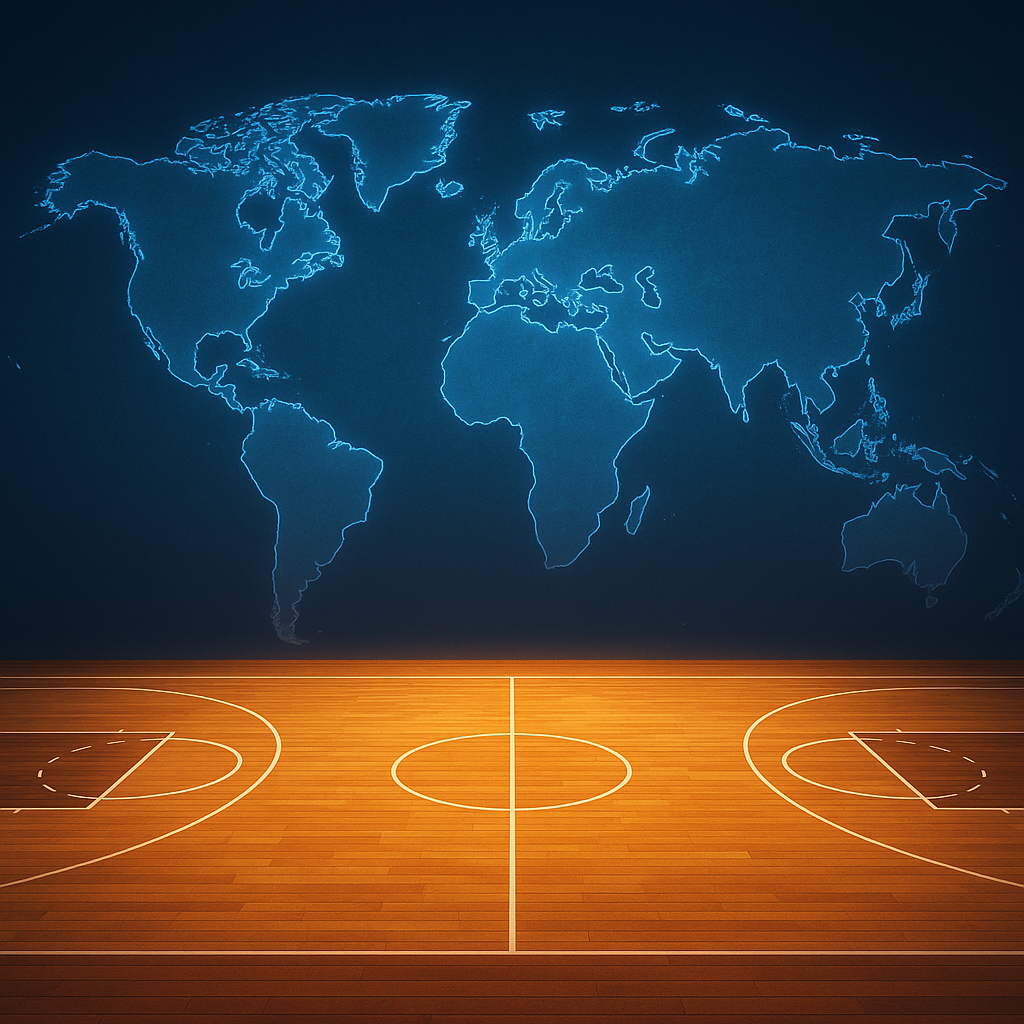a world game, redefined
Before the first basket was scored on opening night, the NBA had already made history. The 2025–26 season tipped off with 135 players born outside the United States, the highest number ever recorded in league history. Those players represent 43 different countries, reflecting not just a league, but a living map of global basketball influenceThis year, Canada leads all nations with 23 players, followed by France with 19 and Australia with 13. Every single NBA team now features at least one player from outside the U.S., a testament to how far basketball’s global reach has extended.
The Atlanta Hawks, once known for their American-heavy rosters, have tied an all-time record with 10 international players, symbolizing the cosmopolitan reality of the modern league.
Even more remarkable: the last seven consecutive MVP awards have been earned by international stars—Giannis Antetokounmpo (Greece), Nikola Jokić (Serbia), and Joel Embiid (Cameroon)—marking an era of dominance from beyond U.S. borders.
the global roots of a modern league
Basketball was born in a Springfield gym in 1891. But today, it belongs to the world.
The NBA’s global ascent didn’t happen overnight. From the pioneering days of Dirk Nowitzki and Yao Ming to the cultural impact of Manu Ginóbili, Tony Parker, and Pau Gasol, international players have steadily woven their identities into the NBA’s narrative.
Yet the tipping point has only recently arrived. Social media, international broadcasting, and grassroots academies have accelerated the sport’s diffusion. The league’s development programs in Africa, Europe, Asia, and Latin America—including Basketball Without Borders and NBA Academies—have created direct pathways to the league.
Today’s international players arrive not as curiosities, but as fully formed professionals with global fan bases of their own. Luka Dončić entered the NBA as a European champion. Victor Wembanyama was already a phenomenon before he ever wore a Spurs jersey. Shai Gilgeous-Alexander carries an entire Canadian generation’s hope with him.
This new wave doesn’t just expand the league’s geography—it redefines its culture.
why the nba’s diversity matters
The surge of foreign-born talent has reshaped the way teams operate. General managers now look beyond U.S. colleges toward leagues like the NBL in Australia, the EuroLeague, and Liga ACB in Spain. Analytics departments mine FIBA data with the same precision once reserved for NCAA play.
For fans, it means a league that feels more like a global festival of styles—European ball movement meeting American athleticism, African power meeting Asian precision.
Culturally, this diversity deepens the NBA’s reach. Every country with an NBA player becomes a micro-market. Every international MVP boosts global ratings. Jerseys sell in dozens of languages, and social media highlights cross borders in seconds.
The modern NBA no longer sells a single nation’s dream—it sells the world’s.
the european frontier
Just as international talent reshapes the league from within, the NBA is reportedly planning a transformation from without: a European league under the NBA umbrella.
According to Commissioner Adam Silver, discussions are underway to launch a Europe-based professional league by 2027 or 2028, possibly in partnership with FIBA. Cities like London, Paris, Berlin, Madrid, and Milan have been floated as potential homes for inaugural franchises.
If realized, NBA Europe would represent the league’s boldest expansion since its foundation. Analysts expect an initial lineup of around 16 teams, mixing existing European basketball institutions with newly created franchises built under the NBA model.
While the details are fluid, the goal is clear—turn the NBA into a truly transcontinental ecosystem, where the next generation of stars could rise without ever crossing the Atlantic.
resistance and opportunity
Not everyone in Europe is thrilled. Executives from the EuroLeague—the continent’s premier competition—have warned that a competing NBA-backed league could fragment the market and undermine local traditions. European basketball thrives on regional rivalries, promotion and relegation systems, and deep-rooted fan cultures that differ from the NBA’s franchise model.
Yet there’s an undeniable allure in joining basketball’s most visible brand. For sponsors, broadcasters, and cities hungry for global attention, NBA Europe offers both visibility and validation. For players, it could mean a new bridge to the world’s most competitive stage—without having to relocate permanently to North America.
The logistical hurdles remain steep—travel schedules, arena standards, and television windows—but the symbolic momentum feels unstoppable. As Silver said earlier this year, “The world has come to the NBA. Now, maybe it’s time the NBA goes to the world.”
building a global empire
Behind the expansion lies a broader strategy. The NBA’s revenue growth increasingly depends on international media rights, merchandise, and digital partnerships. Markets like France, Spain, and the U.K. have already shown massive growth in viewership, while Asian audiences continue to power social engagement metrics.
If the league succeeds in establishing a European division, it could mirror the model of global football—an interlinked ecosystem where leagues coexist, players circulate freely, and local markets retain their own flavor under a universal brand identity.
The NBA, in this sense, isn’t just expanding—it’s evolving into an institution akin to FIFA or UEFA, positioning basketball as the next global language of sport.
occur
What began with 135 international players is much more than a statistic—it’s a statement. The NBA is no longer an American export. It’s an international mixture, pulsing with languages, styles, and dreams that transcend borders.
When the first tip-off of the 2025 season echoed through arenas in Milwaukee, Los Angeles, and Boston, it also reverberated in Toronto, Paris, Melbourne, and Lagos. The sound was familiar, but the meaning had changed.
The NBA has become the world’s court—a stage where the game doesn’t just belong to anyone; it belongs to everyone.
No comments yet.








